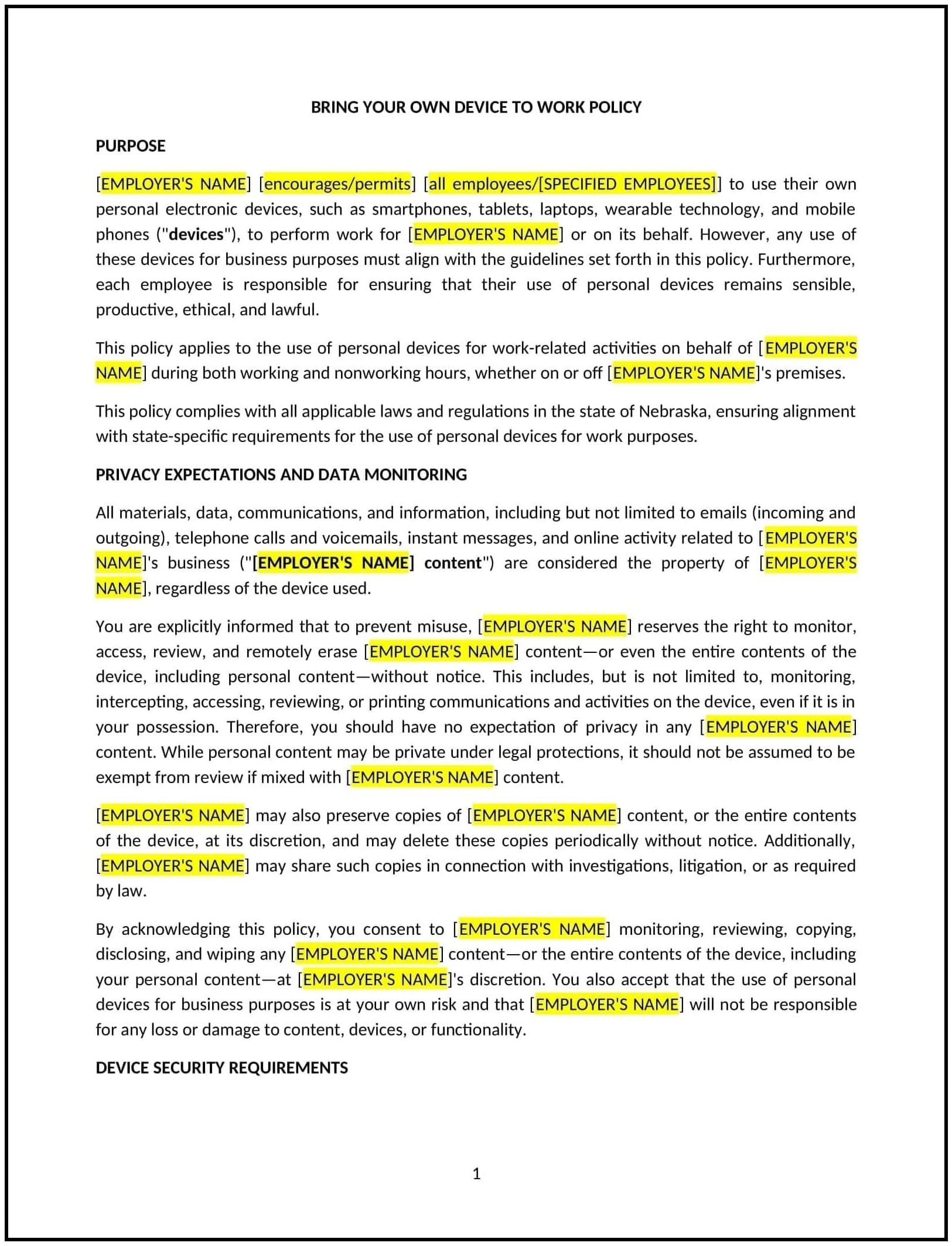Bring your own device to work policy (Nebraska): Free template
Got contracts to review? While you're here for policies, let Cobrief make contract review effortless—start your free review now.

Customize this template for free
Bring your own device to work policy (Nebraska)
A bring your own device (BYOD) policy helps Nebraska businesses outline the guidelines for employees who wish to use their personal devices, such as smartphones, laptops, and tablets, for work purposes. This policy defines the acceptable use, security requirements, and responsibilities of both the employer and employee when using personal devices for business tasks. It is designed to promote flexibility while ensuring the security of business data and protecting the integrity of the company's systems.
By adopting this policy, businesses in Nebraska can offer employees the flexibility to use their own devices while maintaining control over data security, privacy, and productivity.
How to use this bring your own device to work policy (Nebraska)
- Define acceptable devices: Specify the types of devices that are permitted for use under the BYOD policy, including smartphones, laptops, tablets, and any other personal devices employees are allowed to use for work purposes.
- Set security requirements: Establish clear security protocols, including the use of strong passwords, encryption, and multi-factor authentication. Define the measures employees must take to protect company data on personal devices, such as installing antivirus software and using a virtual private network (VPN).
- Outline acceptable use: Clearly explain the work-related tasks employees can use their personal devices for, such as accessing work email, documents, or using specific business apps. Also, specify any prohibited uses of personal devices at work.
- Set data management rules: Specify how business data should be handled on personal devices, including rules on data storage, access, and sharing. The policy should also outline what happens if a device is lost or stolen, including remote wipe capabilities.
- Address privacy concerns: Ensure that employees understand the boundaries between personal and business data. Make it clear that while personal devices are used for work, the business retains the right to monitor and manage business data.
- Provide support and limitations: Outline what technical support the business will provide for personal devices, and set clear limits regarding the use of company resources for troubleshooting or fixing personal devices.
- Review and update: Periodically review and update the policy to account for new technologies, security risks, or changes in business operations and data management practices.
Benefits of using this bring your own device to work policy (Nebraska)
This policy provides several benefits for Nebraska businesses:
- Increases employee flexibility: Allowing employees to use their own devices promotes flexibility and can lead to higher job satisfaction, as employees can work on devices they are familiar with.
- Enhances productivity: BYOD policies can contribute to greater efficiency, as employees can work from any location, using their preferred devices and accessing company data remotely.
- Reduces company costs: BYOD can help businesses reduce costs related to providing and maintaining devices for employees, particularly in larger companies or with remote workers.
- Improves data security: With clear security protocols in place, businesses can ensure that sensitive company data remains secure, even on personal devices.
- Fosters a more mobile workforce: A well-structured BYOD policy can facilitate a mobile, agile workforce, helping businesses stay competitive in today’s increasingly flexible work environment.
Tips for using this bring your own device to work policy (Nebraska)
- Communicate the policy clearly: Ensure that all employees understand the rules and expectations for using personal devices for work purposes. Make sure they are aware of the security measures and privacy policies in place.
- Provide regular training: Offer training sessions on how to securely use personal devices for work, covering topics like password security, device encryption, and remote wipe protocols.
- Ensure compatibility: Ensure that personal devices can effectively integrate with company systems, applications, and security measures to avoid technical issues or data breaches.
- Maintain a balance between privacy and security: While securing company data, respect employees' privacy by establishing clear boundaries between work and personal data on their devices.
- Monitor and update: Regularly monitor the use of personal devices for work and adjust the policy as needed to address new security risks, technological changes, or updates to business operations.